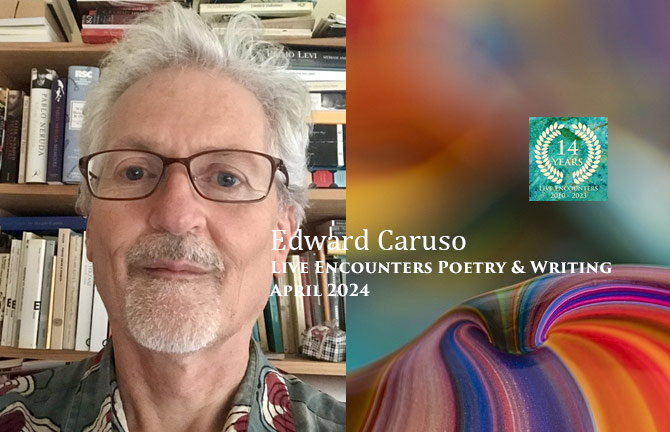
Live Encounters Poetry & Writing April 2024.
Patria, poems by Edward Caruso.
Patria*
She left Moldova
four years ago
and speaks Italian
with Emilian cadences.
Since the last trip home
her family calls her ‘the Italian’.
She talks of Pushkin.
On my praising him, she asks:
‘Why do you admire Russian writers?’
‘When one is in his early twenties
and reads Dostoyevsky for the first time
there are emotions,’ I reply.
Such writers claimed as her own,
the air that we’ve brought,
from further down
the Po Valley and beyond,
we speak of her time in Parma,
any aspiration possible.
On farewell
her presence remains,
among recollections
of Tolstoy’s last journey,
his death
in a railway station
and the departures
announced in this one,
a link, if only in passing.
* Homeland
There was once an Austrian in me, too*
Way past the forlorn pines that whisper
above the Sunday walkers of Vienna,
the Mozart parodies, eighteenth-century costumes
and perfumed just-mowed lawns of Sigmund Freud Park,
Tibetans in orange saris dance
to camera eyes and mist-like summer parodies.
Beyond the Hapsburg gates
and St Stephen’s homily to the warm tourist morning,
as the sun frisks buskers, one plays the statue,
painted in gold, mimicking stillness.
The crowd will murmur, as if some forsaken shower
could wash the precious metal away.
No one gives coins to the twitching figure,
just bread for pigeons that land on his wig.
The Austrian empire has long abandoned its canons,
armies that scaled the continent hibernating forever
like the Caesars, ghosts of the Ottomans,
Alexander and the Huns.
Borders have shrunk and there’s the shadow of a soldier
who left for Italy during the Napoleonic wars.
Almost two centuries later,
his contours once believed in me,
when I was in Istanbul in 2000 some did approach,
speaking a fluid German that had me thinking
the Hapsburg soldier’s DNA was part of mine.
I’d shrink away, only knowing how to reply
in Italian or English to the surprised faces
who must have deemed me apocalyptic. But languages
don’t resemble the moon’s landscape, they’re earthbound
and function when gravity allows the inner ear
to fulfil the promise of Evolution.
Civilisation can be so global that one feels connected
to places one hasn’t lived or set foot in before.
We have all manner of nations and flags,
and as pure as we are to alphabets or expression,
let all Mozarts flock to Vienna.
Let them alphabetise music from the soapbox
of their subconscious, post-Freud, and dialogue
with the collective entity of the virtual universe
and its technologies. May we all be blessed,
no matter how much Mozart loathed Wien.
His notes are still with us, as the Tibetans of the park,
language reputedly more erudite
than any myth that escapes us.
* Based on a family story concerning Austrian ancestry that turned out to be a myth
thanks to family history research by my sister 15 years after this poem was written.
Hence the title change from ‘There is …’ to ‘There was once …’.
East*
3
Remember what it felt like
to be home?
All is restored in grief
for abandoned children,
new lodgings to be built
and shore fortified.
4
Each inlet a reference point
by a sea so transparent
you dive to the bottom
to view the sky from beneath,
saltwater the wine of horizons,
a sun out-glowing any fire,
other sailors will drift by,
your presence the light
of lands that could lie ahead.
5
Discard final testaments.
You,
another sailor gone to your maker.
* Sometimes we don’t know who we are; who we were; who we will be.
© Edward Caruso
Edward Caruso has been published by A Voz Limpia, Australian Multilingual Writing Project, ‘La Bottega della Poesia’ (La Repubblica, Italy), Burrow, Communion, Kalliope X, Mediterranean Poetry, Meniscus, Melbourne Poets Union, n-Scribe, Right Now, StylusLit, TEXT, Unusual Work and Well-Known Corners: Poetry on the Move. His second collection of poems, Blue Milonga, was published by Hybrid Publishers in 2019. In August 2019, he featured on 3CR’s Spoken Word program.

